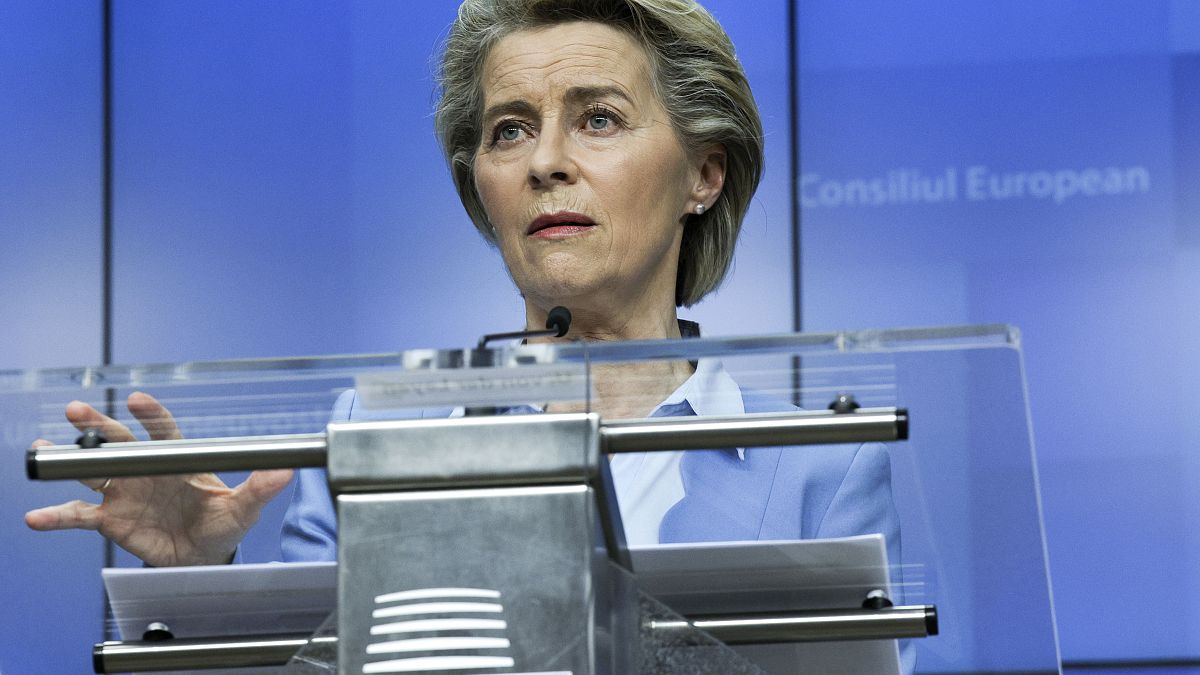The European Union has committed to donate at least 100 million doses of coronavirus vaccines to middle- and low-income countries before the end of the year.
The European Union has committed to donate at least 100 million doses of coronavirus vaccines to middle- and low-income countries before the end of the year. The bloc will also provide assistance to non-EU countries to help them develop local manufacturing capacity.
The double pledge comes following an EU summit in Brussels where European leaders tackled the ongoing crisis in Belarus, relations with Russia and the United Kingdom, the evolution of the COVID-19 pandemic and the threat of climate change.
"Donations are desperately needed," said European Commission President Ursula von der Leyen, referring to the announcement that the Serum Institute of India, the world's largest vaccine manufacturer, has decided to halt exports for the remainder of 2021.
Standing next to European Council President Charles Michel, von der Leyen said the EU will provide assistance to developing countries, particularly in Africa, to help them build expertise and produce their own vaccines.
Von der Leyen hopes this partnership will bring mRNA vaccines, like the Pfizer-BioNTech jab, to African countries, something that "hasn't happened so far".
The conclusions from the summit did not include any mention of the proposal made by the United States to lift vaccines' intellectual property rights.
The absence reflects the general opinion in Brussels and across the continent that patent waivers do not represent an immediate solution to vaccine shortages.
Concerning the evolution of the pandemic, EU leaders highlighted the progress made in the national vaccination campaigns and supported a "gradual reopening" of their economies. However, they cautioned against the possible emergence and spread of new COVID-19 variants.
Von der Leyen said the European Centre for Disease Prevention and Control (ECDC) should expand its monitoring system beyond Europe and encompass the whole world in order to detect mutations and be "one step ahead".
According to figures provided by von der Leyen, by the end of May around 46% of the EU adult population will have received at least one dose of a coronavirus vaccine, putting the bloc in the path towards herd immunity (over 70% of adults inoculated) by the end of July. Total deliveries to EU countries are expected to surpass 1 billion doses by the end of September.
Brussels hopes the European Medicines Agency (EMA) will soon approve the use of the Pfizer-BioNTech vaccines for children between 12 and 15 years old.
EU leaders also welcomed the provisional agreement on the "EU Digital COVID Certificate" that was reached last week between the European Parliament and representatives from the 27 member states.
Von der Leyen said the IT infrastructure will be in place in early June and urged national authorities to make sure they feed the system with the necessary information to allow citizens to apply and obtain the travel pass. The certificate will be based on three elements: proof of vaccination, a negative PCR test and a medical statement of COVID-19 recovery.
"[The certificate] is a unique opportunity to showcase how the EU contributes concretely to people's daily lives," the Commission chief said.
Unity around climate goals
Besides the pandemic, EU leaders also used Tuesday's summit session to discuss the bloc's climate goals. In the coming weeks, the European Commission will present a legislative package of twelve proposals designed to cut greenhouse gas emissions by at least 55% by 2030 and attract investment.
According to Michel, the heads of government and state expressed their "priorities and legitimate concerns" to von der Leyen and will examine the matter once the executive has put forward the legislative package.
While no new commitments were made in this regard, von der Leyen called it a "major success" that no EU country is questioning the bloc's climate ambitions.
Von der Leyen's comment was seen as an implicit reference to Poland's refusal to join the 2050 climate neutrality pledge. Back in December 2019, the country made international headlines when it opted out of conclusions where -- for the first time ever -- EU leaders agreed to make the bloc climate neutral by 2050.
To bypass internal disagreements, the European Commission later introduced a climate law to render the 2050 pledge legally binding for all member states.
Poland's acquiescence will help the EU consolidate a united position by the time UN Climate Change Conference COP26 takes place in Glasgow in November.
